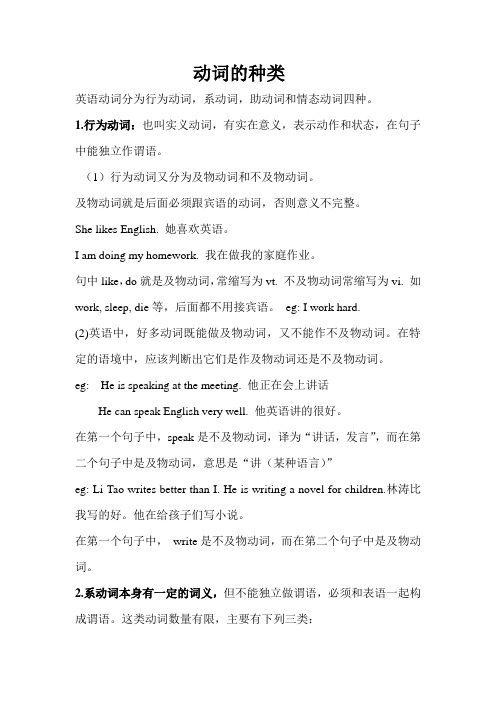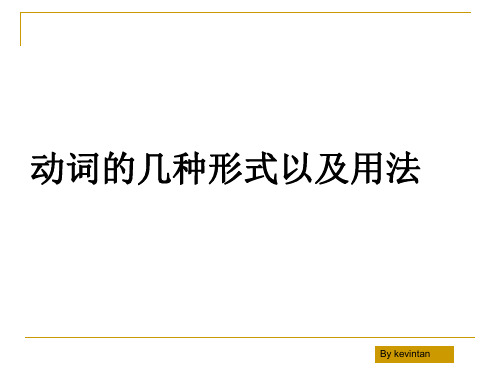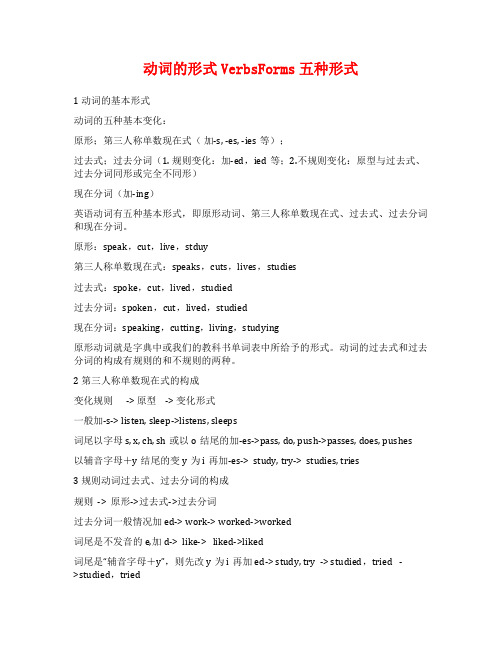动词的四种形式
动词的种类

动词的种类英语动词分为行为动词,系动词,助动词和情态动词四种。
1.行为动词:也叫实义动词,有实在意义,表示动作和状态,在句子中能独立作谓语。
(1)行为动词又分为及物动词和不及物动词。
及物动词就是后面必须跟宾语的动词,否则意义不完整。
She likes English. 她喜欢英语。
I am doing my homework. 我在做我的家庭作业。
句中like,do就是及物动词,常缩写为vt. 不及物动词常缩写为vi. 如work, sleep, die等,后面都不用接宾语。
eg: I work hard.(2)英语中,好多动词既能做及物动词,又不能作不及物动词。
在特定的语境中,应该判断出它们是作及物动词还是不及物动词。
eg: He is speaking at the meeting. 他正在会上讲话He can speak English very well. 他英语讲的很好。
在第一个句子中,speak是不及物动词,译为“讲话,发言”,而在第二个句子中是及物动词,意思是“讲(某种语言)”eg: Li Tao writes better than I. He is writing a novel for children.林涛比我写的好。
他在给孩子们写小说。
在第一个句子中,write是不及物动词,而在第二个句子中是及物动词。
2.系动词本身有一定的词义,但不能独立做谓语,必须和表语一起构成谓语。
这类动词数量有限,主要有下列三类:(1)强调状态变化:get, become, turn, go,come等(2)表示保持状态的:be, keep, stay等。
(3)表示主语特征或状态的:smell, feel, taste, look, sound等。
作为系动词,他们是不能单独做谓语的,必须和名词,形容词或相当于名词(形容词)的分词,动词ing形式等一起做谓语,在主语和表语之间起练习作用。
eg: The food went bad. Father looks very angry.食物坏了,父母很生气。
英语动词形式的变化口诀

英语动词形式的变化口诀:
英语动词形式的变化口诀:
动词根本是原形,变化形式有四种: 原形词尾加“s”,现在第三单人称; 过去原形加“ed”,过去分词也相同; 原形加上“ing”,现在分词或动名。 原形词尾加“s”,如同名词复数式。
英语动词形式的变化口诀:
若加“ed/ing”,以下情况要注意: 词尾有e只加d,ing去无声e; 词尾ie变成y,然后再加ing; 辅音之后y结尾,y要变i加ed; 现在分词不变y,直接加上ing ;
英语动词形式的变化口诀:
词尾重读闭音节,加缀辅音都双写, r做结尾也一样,重读音节r双写; 结尾字母如是“t”,不是重读也双写。 过去分词过去式,不按规则也有些。
巧记lie和lay
巧记lie和lay 躺lied,lied,dont be a liar; 产蛋 lay,laid,laid,a hen laid an egg; 放置 A loy picked it up,and laid it in the bag.
动词的四种变化形式

动词的四种变化形式动词的四种变化形式通常指动词的原形、第三人称单数形式、过去式和过去分词。
1. play - plays - played - played 解释:I play football. (原形)He plays football every day. (第三人称单数)We played football yesterday. (过去式)The game has been played many times. (过去分词)2. work - works - worked - worked 解释:They work hard. (原形)She works in a factory. (第三人称单数)I worked late last night. (过去式)The problem has been worked out. (过去分词)3. study - studies - studied - studied 解释:You study English. (原形)He studies very well. (第三人称单数)They studied for the exam. (过去式)The subject has been studied deeply. (过去分词)4. go - goes - went - gone 解释:Let's go. (原形)She goes to school by bus. (第三人称单数)We went to the park last week. (过去式)The book has gone missing. (过去分词)5. do - does - did - done 解释:I do my homework. (原形)He does exercise every morning. (第三人称单数)They did a lot of things yesterday. (过去式)The job has been done. (过去分词)6. have - has - had - had 解释:We have lunch at noon. (原形)She hasa new dress. (第三人称单数)I had a great time last weekend. (过去式)The project has had many difficulties. (过去分词)7. see - sees - saw - seen 解释:I see a bird. (原形)He sees the sign. (第三人称单数)They saw a movie last night. (过去式)The film has been seen by many people. (过去分词)8. come - comes - came - come 解释:Come here. (原形)She comes from China. (第三人称单数)He came to my house yesterday. (过去式)The guests have come. (过去分词)9. eat - eats - ate - eaten 解释:They eat apples. (原形)She eats an egg for breakfast. (第三人称单数)We ate pizza last night. (过去式)The food has been eaten. (过去分词)10. drink - drinks - drank - drunk 解释:I drink water. (原形)He drinks coffee. (第三人称单数)They drank juice at the party. (过去式)The wine has been drunk. (过去分词)11. write - writes - wrote - written 解释:She writes a letter. (原形)He writes stories. (第三人称单数)I wrote a composition yesterday. (过去式)The book has been written. (过去分词)12. run - runs - ran - run 解释:I run fast. (原形)He runs every morning. (第三人称单数)They ran in the race. (过去式)The machine has been run for hours. (过去分词)13. swim - swims - swam - swum 解释:You swim well. (原形)She swims in the pool. (第三人称单数)We swam in the river last summer. (过去式)The pool has been swum in. (过去分词)14. fly - flies - flew - flown 解释:The bird flies high. (原形)He flies a kite.(第三人称单数)They flew to Beijing last month. (过去式)The plane has flown for a long time. (过去分词)15. speak - speaks - spoke - spoken 解释:I speak English. (原形)She speaks French. (第三人称单数)We spoke on the phone last night. (过去式)The language has been spoken. (过去分词)16. tell - tells - told - told 解释:He tells a story. (原形)She tells the truth. (第三人称单数)I told him the news. (过去式)The secret has been told. (过去分词)17. think - thinks - thought - thought 解释:I think you are right. (原形)He thinks carefully. (第三人称单数)They thought about it. (过去式)The problem has been thought over. (过去分词)18. get - gets - got - got 解释:I get up early. (原形)She gets a present. (第三人称单数)We got there at six. (过去式)The work has got done. (过去分词)19. give - gives - gave - given 解释:He gives me a book. (原形)She givesa speech. (第三人称单数)I gave him some money. (过去式)The gift has been given. (过去分词)20. take - takes - took - taken 解释:You take a photo. (原形)He takes a bus to work. (第三人称单数)We took a trip last year. (过去式)The medicine has been taken. (过去分词)21. know - knows - knew - known 解释:I know him. (原形)She knows the answer. (第三人称单数)They knew each other before. (过去式)Thefact has been known. (过去分词)22. keep - keeps - kept - kept 解释:We keep quiet. (原形)He keeps a diary. (第三人称单数)I kept waiting for him. (过去式)The secret has been kept. (过去分词)23. leave - leaves - left - left 解释:She leaves home at seven. (原形)He leaves for work. (第三人称单数)We left the party early. (过去式)The bag has been left. (过去分词)24. lose - loses - lost - lost 解释:I lose my key. (原形)He loses his temper. (第三人称单数)They lost the game. (过去式)The book has been lost. (过去分词)25. find - finds - found - found 解释:I find my pen. (原形)She finds a job. (第三人称单数)We found the way. (过去式)The lost dog has been found. (过去分词)26. make - makes - made - made 解释:He makes a cake. (原形)She makes friends. (第三人称单数)I made a mistake. (过去式)The chair has been made. (过去分词)27. read - reads - read - read 解释:I read a book. (原形)He reads the newspaper. (第三人称单数)We read aloud yesterday. (过去式)The story has been read. (过去分词)28. sell - sells - sold - sold 解释:She sells flowers. (原形)He sells cars. (第三人称单数)They sold the house. (过去式)The goods have been sold. (过去分词)29. buy - buys - bought - bought 解释:I buy a pen. (原形)She buys some fruit. (第三人称单数)We bought a new TV. (过去式)The present has been bought. (过去分词)30. bring - brings - brought - brought 解释:He brings a book. (原形)She brings some flowers. (第三人称单数)I brought my camera. (过去式)The food has been brought. (过去分词)31. teach - teaches - taught - taught 解释:She teaches English. (原形)He teaches math. (第三人称单数)They taught us last year. (过去式)The lesson has been taught. (过去分词)32. catch - catches - caught - caught 解释:I catch a fish. (原形)He catches the ball. (第三人称单数)We caught the thief. (过去式)The disease has been caught. (过去分词)。
规则动词四种形式及规则

规则动词实义动词有四种形式:work worked worked workinglook looked looked lookingwatch watched watched watchingjump jumped jumped jumpingwalk walked walked walkingtalk talked talked talkingask asked asked askinghelp helped helped helpingwash washed washed washingcook cooked cooked cookingfetch fetched fethed fetching2. 以浊辅音、鼻音结尾的规则动词加上-ed后的读音为[d]clean cleaned cleaned cleaningopen opened opened openingplay played played playingstay stayed stayed stayingrepair repaired repaired repairingrain rained rained rainingsnow snowed snowed snowingsharpen sharpened sharpened ~ingrow rowed rowed rowingboil boiled boiled boilingshow showed showed showingcall called called callinglisten listened listened listeningair aired aired airingclimb climbed climbed climbingremain remained remained remainingremember remembered remembered rememberinglean leaned leaned leaningenjoy enjoyed enjoyed enjoyingturn turned turned turninglearn learned learned learning3. 以不发音的-e结尾的规则动词只加上-d就可以,与不发音的-e后在一起的读音要根据词尾的读音而定,尾音是轻辅音-ed 就读[t], 尾音是浊辅音-ed就读[d].type typed typed typinglike liked liked likingdance danced danced dancingsmoke smoked smoked smokinglive lived lived livingarrive arrived arrived arrivingskate skated skated skatingphone phoned phoned phoningmove moved moved movingshave shaved shaved shaving4. 以辅音+y结尾的规则动词需要现将y变为i, 然后再加上-ed,-ed的读音为[d] study studied studied studyingempty emptied emptied emptyingtidy tidied tidied tidyingcry cried cried crying5. 以字母-t结尾的规则动词加上-ed,-ed的读音为[it], 与词尾的-t一起读[tit].want wanted wanted wantingdust dusted dusted dustingpoint pointed pointed pointingpaint painted painted paintinglift lifted lifted liftingwait waited waited waitingplant planted planted plantinggreet greeted greeted greeting6. 以字母-d结尾的规则动词加上-ed,-ed的读音为[id], 与词尾的-d一起读[did]. mend mended mended mendinghand handed handed handingneed needed needed needing7. 重读闭音节结尾的规则动词需要先双写最后一个字母,然后再加上-ed,-ed的读音要根据词尾的读音而定,尾音是轻辅音-ed 就读[t], 尾音是浊辅音-ed就读[d].stop stopped stopped stoppingdrop dropped dropped dropping11.去年我在我爸爸的公司工作。
动词的四种形式

动词ing 形式
根据括号所给内容,写出形式正确的 单词。
cows are _______( drinking 饮)water . Amy likes collecting _______(收集)stamps. Keep on _______( practising 练习)Chinese every day. sleeping 睡觉) Look! Some pigs are______( under the tree.
By kevintan
按要求完成句子。
We are having a picnic in the park.(用 yesterday改写句子) We _____ had a picnic in the park. They sometimes clean the classroom.(用he改 写句子) He cleans _____sometimes _____ the classroom. He ate dinner last night. (改成现在进行时) He _____ is _____ eating dinner.
Sam
By kevintan
动词过去式
She spoke very little English four years ago.
We had a picnic in the park yesterday.
By kevintan
什么情况下动词用过去式?
动词过 去式
句子中有过去时间 动词要用过去式
动词
动词四 种形式
一般现在时的 情况下,主语 是第三人称单 数,动词用三 单形式。
英语中动名词是什么

英语中动名词是什么动词有四种变化形态,分别是:不定式(to do)、动名词(V-ing)、现在分词(V-ing)和过去分词(V-ed)。
再次强调以下至关重要的概念:不定式是助动词的变化,带有不确定的语气;动名词是动词的名词化,可以用在主语及宾语等位置;而分词则是形容词化,可以当形容词用。
动名词是具有名词性质的动词形式,是一种非谓语动词,这种形式兼有动词性质和名词性质,在句子中可以做主语、宾语、表语、定语等成分,几乎名词能做的成分动名词都能作,所以动名词可以说是更倾向于名词,因此叫动名词。
(归根结底动名词的词性是名词。
)一、动名词作主语。
1、直接位于句首,如:Swimming is a good sport in summer.在夏天,游泳是一项好的消遣。
2、用it 作形式主语,把动名词(真实主语)置于句尾作后置主语。
,如:It is no use telling him not to worry.告诉他不要担心是没有用的。
(这个句型中真正主语只能是v-ing形式)注意:important,essential,necessary 等形容词不能用于上述结构。
3. 用于“There be”结构中,如:There is no saying when he'll come.很难说他何时回来。
(There is + no + doing something 是英语中的固定搭配,表示“说不上du;很难说”。
)4. 动名词的复合结构作主语:当动名词有自己的逻辑主语时,常可以在前面加上一个名词或代词的所有格,构成动名词的复合结构, 动名词疑问句通常使用这种结构做主语Their coming to help was a great encouragement to us.他们来支援我们是很大的鼓舞。
Does your saying that mean anything to him?你的话对他有什么意义吗?二、动名词作宾语1. 作动词的宾语某些动词后出现非限定性动词时只能用动名词作宾语,不能用不定式。
动词的四种形式

VIII.一般将来时
1、一般将来时用法:
表示将要发生的动作或存在的状态
2、谓语构成
(1)will 加动词原形 (第一人称也可用 shall ) (2)be going to 加动词原形 (3)be to 加动词原形:安排好的事 (4)按时刻表进行的, 可用现在时表示将来 (5)用进行时表示将来 (6)主句是将来时,条件从句用现在时
(go)to
Last week, I _w__e_n_t_ (go) to the theatre. I _h__a_d_ (have) a very good seat. The play _w__a_s_ (be) very interesting. I _d_i_d_n_o__t _e_n_j_o_y(not, enjoy) it. A young man
(turn) round again. “I can’t hear a word!” I __s_a_id__ (say)
angrily.
“It’s none of your business,” the young man __s_a_id__
(say) rudely. “This is a private conversation!”
III.现在进行时
1、现在进行时用法:
1)表示此时此刻正在进行的动作 2)表示目前这段时间内正在进行的动作 3)与 always 连用表示赞扬、不满等情绪
I am teaching and you are listening to me. He is writing a book this week. The girl is always smiling happily.
VII.现在完成进行时
动词的形式VerbsForms五种形式

动词的形式VerbsForms五种形式1 动词的基本形式动词的五种基本变化:原形;第三人称单数现在式(加-s, -es, -ies等);过去式;过去分词(1. 规则变化:加-ed,ied等;2.不规则变化:原型与过去式、过去分词同形或完全不同形)现在分词(加-ing)英语动词有五种基本形式,即原形动词、第三人称单数现在式、过去式、过去分词和现在分词。
原形:speak,cut,live,stduy第三人称单数现在式:speaks,cuts,lives,studies过去式:spoke,cut,lived,studied过去分词:spoken,cut,lived,studied现在分词:speaking,cutting,living,studying原形动词就是字典中或我们的教科书单词表中所给予的形式。
动词的过去式和过去分词的构成有规则的和不规则的两种。
2 第三人称单数现在式的构成变化规则 -> 原型 -> 变化形式一般加-s-> listen, sleep->listens, sleeps词尾以字母s, x, ch, sh或以o结尾的加-es->pass, do, push->passes, does, pushes以辅音字母+y结尾的变y为i再加-es-> study, try-> studies, tries3 规则动词过去式、过去分词的构成规则 -> 原形->过去式->过去分词过去分词一般情况加 ed-> work-> worked->worked词尾是不发音的e,加d-> like-> liked->liked词尾是“辅音字母+y”,则先改y为i再加ed-> study, try -> studied,tried ->studied,tried以清辅音结尾,且词尾只有一个辅音字母,则先重复这个字母后加ed-> stop, plan -> stopped,planned ->stopped,planned3-1 词尾-ed有三种读法:读音 -> 范例-ed在[d] [t] 后读 [Id]-> needed [`nidId] , wanted[`wantId]在元音或[d] 外的浊辅音后读 [d]-> lived [ lIvd], played[pled]在除了[t]以外的清辅音后读[t]->helped[hεlpt],worked[wʒkt]3-2 动词的过去式重复词尾加 -ed的单词shop → shopped购买,买stop → stopped停(下)drop → dropped掉下来prefer → preferred宁可(而不)travel → travelled旅行3-3 以y 结尾, y前是辅音字母,去掉 y变i加-ed 的词carry → carried study → studiedworry → worried hurry → hurriedcopy → copied try → triedspy → spied fry → friedtidy → tidied cry → cried4 不规则动词占动词的少数,但有许多是常见词,不规则动词的形式有四种情况。
- 1、下载文档前请自行甄别文档内容的完整性,平台不提供额外的编辑、内容补充、找答案等附加服务。
- 2、"仅部分预览"的文档,不可在线预览部分如存在完整性等问题,可反馈申请退款(可完整预览的文档不适用该条件!)。
- 3、如文档侵犯您的权益,请联系客服反馈,我们会尽快为您处理(人工客服工作时间:9:00-18:30)。
2、谓语构成
1)肯定句:谓语用动词的过去式
bought a pen. Yesterday, I _____ went to a shop and _______
2)否定句:助动词 didn’t 加动词原形
Shedidn’t ________(take) any money with her that day. take
3)一般问句:助动词 Did 加陈述句(动词用原形)
go to the cinema last night? ---____ Did you _____ ---No, I didn’t.
4)特殊问句:疑问词 + 一般问句 ---_______ Where ____ did you find your key?
(4)按时刻表进行的, 可用现在时表示将来 (5)用进行时表示将来
2、谓语构成
1) 肯定句:谓语用动词原形或第三人称单数
go to work by bike every day. Tom’s parents _____ Li Tao _______ studies English every morning. 2) 否定句:谓语用 don’t/doesn‘t 加动词原形构成 don’t get (not get) up at six every morning. I ________ She ____________ doesn’t watch (not watch) TV in the evening.
I. 一般现在时
1、一般现在时用法:
1)经常性、习惯性的动作
I go to work by bus.
2)现在的特征或状态
I am a teacher and I teach English. I love sports.
3)普遍பைடு நூலகம்理
Light travels faster than sound. Water boils at 100℃.
动词的四种形式
原形 过去式 过去分词 现在分词
1. 过去式、过去分词: 1)在原形动词词尾加-ed 清辅音后读/t/, 浊辅音、元音后读/d/, /t/、/d/后读/id/ work---worked /t/ open---opened /d/ play---played /d/ hand---handed /id/ 2)以辅音字母加 y 结尾的, 变 y 为 i 再加-ed study---studied carry---carried 3)一个辅音字母(w、y、x除外)结尾的重读闭音节词, 先双写再加-ed stop---stopped regret---regretted
teach---teaching study---studying play---playing 2)以不发音字母 e 结尾的,先去 e 再加-ing write---writing take---taking have---having
3)以一个辅音字母(w、y、x)结尾的重读闭音节词, 先双写再加-ing
---I _______ found it under my desk.
特殊句式 1. It’s time we ________ (have) a rest. had It’s (high) time 后从句谓语用过去式 2. I would rather he _______ came (come) with you. would rather 后从句谓语一般用过去式
(2)be going to 加动词原形 a. 打算、计划做某事
am going to buy a dictionary tomorrow. I _______________
is going to be a wonderful film in our There ______________ school tonight. b. 即将、眼看要发生 Look at the dark clouds. It________________ . is going to rain (3)be to 加动词原形:安排好的事 We _____________ are to meet at the entrance of the park.
III. 一般将来时 1、一般将来时用法:
表示将要发生的动作或存在的状态
I will go to Tibet some day by plane. He will be busy tonight. 2、谓语构成
1)肯定句 (1)will 加动词原形 (第一人称也可用 shall )
She __________ will come back in twenty minutes.
Last week, I ______ went (go) to the theatre. I _____ had (have) a very good seat. The play _____ was (be) very did not enjoy (not, enjoy) it. A young interesting. I ____________ were sitting (sit) behind me. man and a young woman __________ They ___________ were talking (talk) loudly. I _____ got (get) very angry. I could not hear the actors. I _______ turned (turn) round. I _________ looked (look) at the man and the woman did not pay (not, pay) any attention. angrily. They ___________ In the end, I could not bear it. I ________ turned (turn) round again. “I can’t hear a word!” I ______ said (say) angrily. “It’s none of your business,” the young man ______ said (say) rudely. “This is a private conversation!”
beg---begging stop---stopping begin---beginning 4)以 ie 结尾的先变 ie 为 y 再加-ing lie---lying die---dying tie---tying 但:ski---skiing 3、现在时动词第三人称单数: 1)原形动词后加-s stop---stops write---writes play---plays 2)以 s、x、o、ch、sh 结尾的加-es pass---passes fix---fixes do---does watch---watches wash---washes 3) 以辅音字母 +y 结尾的变 y 为 i 再加-es study---studies try---tries say---says
3) 一般问句: 用 Do 或 Does 加陈述句(谓语动词用原形)
---______ Does he _______ work (work) in a plastic factory? ---No, he doesn’t.
(4) 特殊问句:疑问词加一般问句 ---___________ How often do you write to him?
II. 一般过去时 1、一般过去时用法:
1)表示在过去时间里发生的动作或存在的状态
He bought a new bike last week. They were in the office just now.
2)表示过去经常或反复发生的动作
When I was a small child, I often went to that park and played football.
2、现在分词:
1)动词原形后加-ing
cost--- cost---cost run--- ran---run bring--- brought---brought teach---taught--- taught do---did---done take--- took--- taken speak--- spoke---spoken
练习:用动词的适当形式填空
1. She _____ was (be) late for work this morning, because didn’t get she ____________ (not, get) up on time. 2. He ________ wrote (write) a letter to his girlfriend last night and he ________ wanted (want) to borrow some money. 3. _____ give (give) you any present Did your friends ______ on your eighteenth birthday? 4. How many computers ______ did he _____ sell (sell) last month? 5. He ________ studied (study) English at the age of five. go (go) to Hong Kong by air last year? 6. ---____ Did you ___ ---Yes, I _____ did . But my parents _____ went (go) there by train.
4)不规则变化:
put--- put--- put come--- came---come buy--- bought---bought catch--- caught---caught go--- went---gone see---saw---seen steal---stole---stolen
